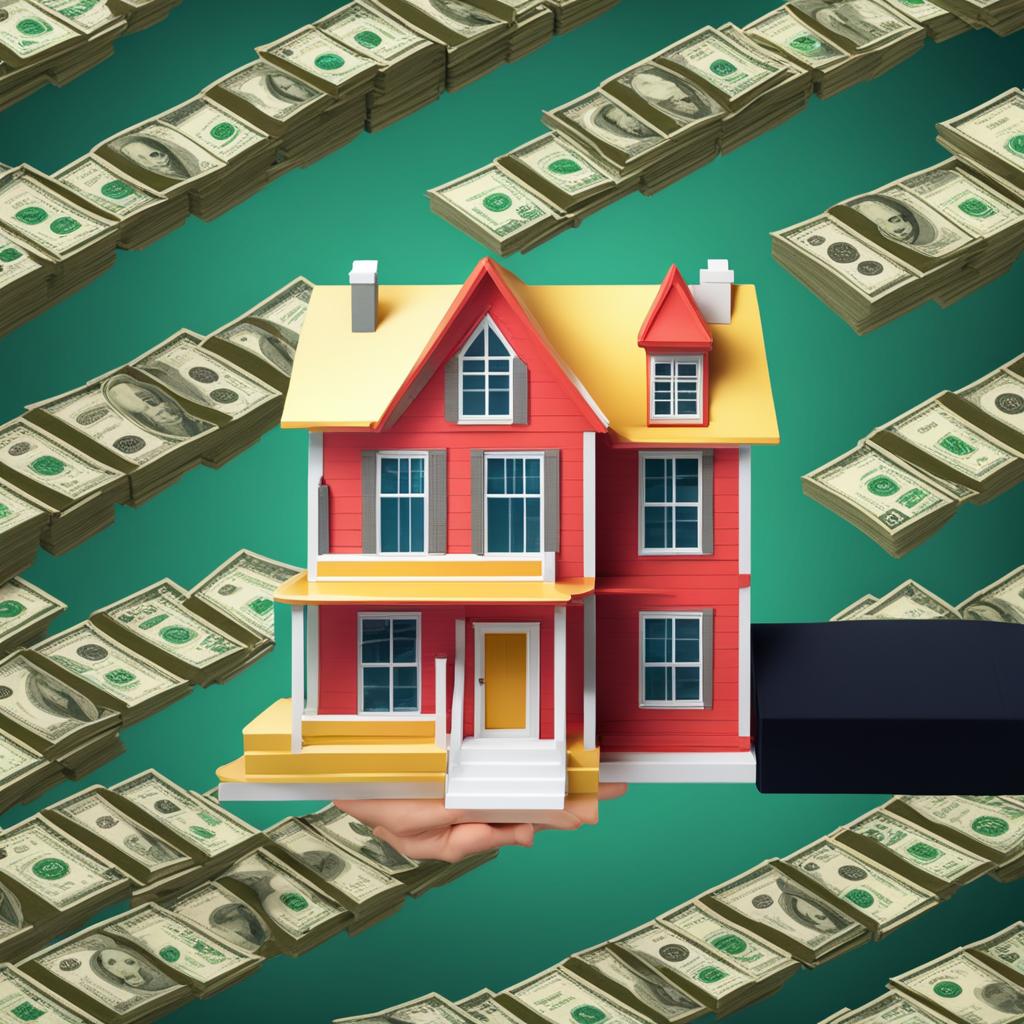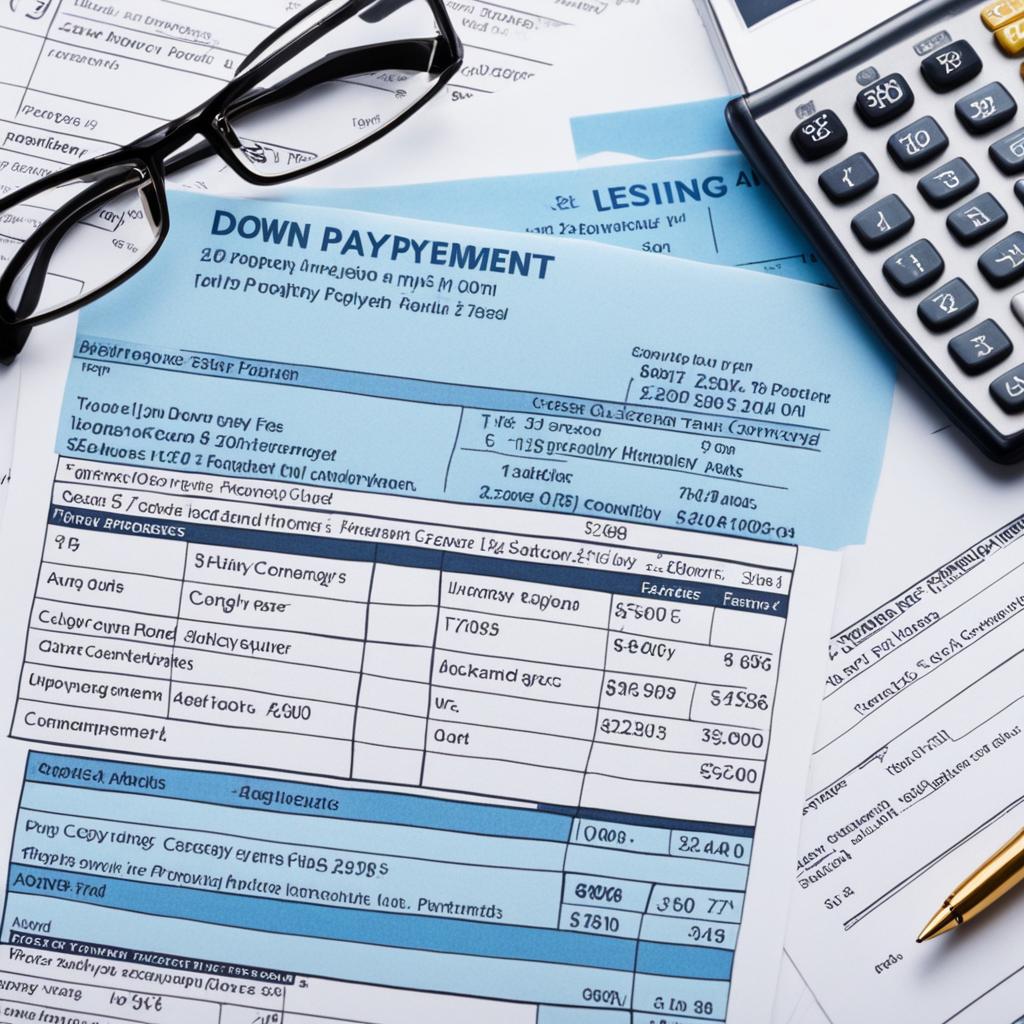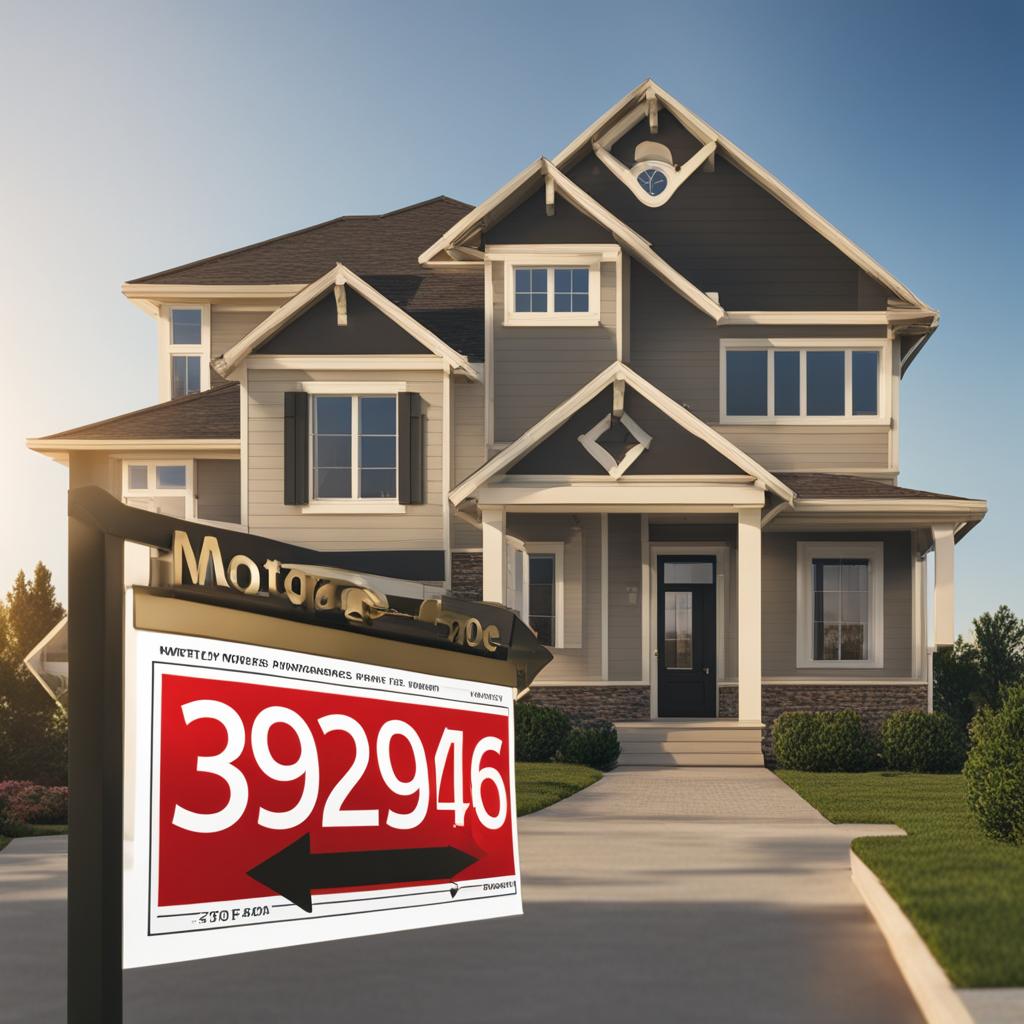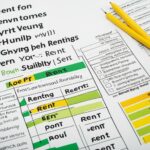Buying a house is a significant milestone, but it’s essential to understand the financial requirements involved. Whether you’re a first-time buyer or looking to upgrade to a new home, determining how much money you need is a crucial first step. In this article, I will break down the costs associated with buying a house, including the down payment, closing costs, and other expenses you need to consider.
Key Takeaways:
- Understanding the total cost of buying a house includes considering the purchase price, down payment, closing costs, and other upfront expenses.
- Home buying expenses can vary based on factors such as the location, type of home, and financing options.
- Creating a budget and saving for a down payment is crucial before embarking on the home buying process.
- Exploring mortgage financing options, such as VA loans or low-down-payment programs, can help overcome limited savings.
- Considering your income and debt levels is essential to determine how much you can afford to spend on a house.
The Costs of Buying a Home
When buying a house, it’s important to consider not only the purchase price but also the additional costs involved. One of the main expenses is the down payment, which typically ranges from 0% to 20% of the purchase price. Additionally, there are closing costs, which can add up to $2,000 to $5,000 for every $100,000 of the home’s price. It’s crucial to budget for these costs to ensure a smooth home buying process.
| Expense | Estimated Cost |
|---|---|
| Down payment | Varies (0% to 20% of purchase price) |
| Closing costs | $2,000 to $5,000 per $100,000 of home price |
Buying a home is a big decision, and understanding the costs involved is essential for proper financial planning. The down payment is typically the largest upfront expense and determines the loan amount and monthly mortgage payments. Saving for a down payment can take time, but it’s important to start early and explore down payment assistance programs if needed.
In addition to the down payment, closing costs are another financial consideration. These costs cover various expenses, including appraisal fees, loan origination fees, title insurance, and attorney fees. It’s important to carefully review the estimated closing costs provided by your lender to have a realistic understanding of the total expenses.
By factoring in the costs of buying a home, such as the down payment and closing costs, you can create a realistic house purchase budget and ensure that you have the necessary financial requirements in place.
Savings Needed To Buy a Home
To buy a home, it’s important to have enough savings to cover not only the down payment but also additional expenses. Building up your savings is crucial for a smooth and successful home buying process.
Firstly, it’s recommended to have a cash cushion to account for any irregular or unpredictable expenses that may arise during the home buying process. This can include costs such as home inspections, repairs, or unexpected moving expenses.
Additionally, it’s wise to have two to six months of reserves set aside for housing expenses. This ensures financial stability and acts as a safety net in case of unforeseen circumstances such as job loss or medical emergencies. Lenders may also require a certain amount of reserves, especially if you have a low credit score or a high debt-to-income ratio.
By having sufficient savings, you’ll have the peace of mind knowing that you can cover not only the immediate costs of buying a home but also any future expenses that may arise. It’s important to prioritize saving and create a budget to reach your savings goals.
Quotes:
“Having enough savings is essential when buying a home. It provides a safety net for unexpected expenses and ensures financial stability throughout the home buying process.” – [Real Estate Agent Name]
Savings Needed To Buy a Home Checklist:
- Create a monthly budget to track your income and expenses.
- Set a savings goal and establish a timeline to achieve it.
- Automate your savings by setting up automatic transfers from your paycheck to a dedicated savings account.
- Look for ways to cut expenses and save more money, such as reducing unnecessary spending or negotiating bills.
- Consider alternative sources of income, such as a side job or freelance work, to boost your savings.
- Research local down payment assistance programs or grants that may be available in your area.
- Consult with a financial advisor to help you create a savings plan tailored to your specific financial situation and goals.
Monthly Expenses Breakdown
| Expense Category | Monthly Cost |
|---|---|
| Mortgage/Rent | $X,XXX |
| Property Taxes | $XXX |
| Homeowners Insurance | $XXX |
| Utilities | $XXX |
| Internet/Cable | $XXX |
| Cell Phone | $XXX |
| Groceries | $XXX |
| Transportation | $XXX |
| Debt Payments | $XXX |
| Entertainment | $XXX |
| Total Monthly Expenses | $X,XXX |
Understanding your monthly expenses is essential for budgeting and determining how much you can save towards your goal of buying a home.
Ways To Buy a Home When You Don’t Have Much Savings
If you find yourself lacking sufficient savings for a traditional down payment, don’t worry; there are still options available to help you achieve your dream of homeownership. Let’s explore some alternative paths you can take:
1. VA Loans for Military Service Members and Veterans
If you are a qualifying military service member, veteran, or surviving spouse, you may be eligible for a VA loan. These loans offer a range of benefits, including the option for a 0% down payment. VA loans are backed by the U.S. Department of Veterans Affairs, making it easier and more affordable for those who have served our country to buy a home.
2. USDA Loans for Rural Property Purchase
If you’re looking to buy property in rural areas, a USDA loan could be a viable option. These loans are designed to support rural homeownership and also require no down payment. The United States Department of Agriculture (USDA) provides these loans to encourage and assist individuals in purchasing homes in designated rural areas.
3. Low- to Moderate-Income Home Buyer Programs
Many states and localities offer home buyer programs specifically aimed at low- to moderate-income individuals and families. These programs can provide various types of assistance, including down payment assistance, favorable loan terms, and educational resources to guide you through the home buying process. Contact your state housing finance agency or local housing authority to explore the options available in your area.
4. FHA Loans with a Lower Down Payment
The Federal Housing Administration (FHA) provides loans that are accessible to borrowers with lower credit scores and smaller down payments. With an FHA loan, you may be eligible for a down payment as low as 3.5% of the purchase price. These loans are insured by the FHA, which allows lenders to offer more favorable terms for buyers who may not qualify for conventional financing.
5. First-Time Home Buyer Assistance Programs
Many state housing finance agencies offer first-time home buyer assistance programs. These programs provide financial assistance and resources specifically tailored to help individuals who are purchasing their first home. Depending on your location, you may be eligible for grants, low-interest loans, or other incentives designed to make homeownership more affordable.
By exploring these options and understanding the specific requirements and benefits associated with each, you can find a path to homeownership that aligns with your financial situation and goals.
If you’d like to learn more about these financing options and see which one is the best fit for you, consult with a reputable mortgage lender who can guide you through the process.
| Loan Option | Down Payment Requirement | Type of Buyer |
|---|---|---|
| VA Loan | 0% | Military service members, veterans, surviving spouses |
| USDA Loan | 0% | Buyers in designated rural areas |
| Low- to Moderate-Income Programs | Varies | Buyers with low to moderate income |
| FHA Loan | 3.5% | Buyers with lower credit scores |
| First-Time Home Buyer Programs | Varies | First-time home buyers |
How Much Money Do You Need To Buy Property?
When it comes to buying a house, understanding the financial requirements is essential. To determine the total amount of money you need to buy a house, several factors come into play. These include the down payment, closing costs, and other upfront expenses that may vary based on your situation and the type of loan you choose.
Let’s take a closer look at these different financial aspects:
The Down Payment
The down payment is a significant upfront cost when buying a house. It is the initial payment you make towards the purchase price of the property. The amount of the down payment typically ranges from 0% to 20% of the purchase price. The higher the down payment, the lower your loan amount and monthly mortgage payments will be. However, there are loan options available that allow for lower down payments, providing more flexibility for buyers.
Closing Costs
In addition to the down payment, you need to budget for closing costs. These costs include fees associated with finalizing the real estate transaction, such as appraisal fees, title insurance, attorney fees, and lender fees. Closing costs typically range from 2% to 5% of the purchase price, but they can vary depending on factors like location and the complexity of the transaction.
Other Upfront Expenses
Aside from the down payment and closing costs, there are other upfront expenses to consider. These may include home inspections, property appraisals, and any necessary repairs or renovations. It’s important to account for these expenses when calculating your overall budget for buying a house.
By considering all of these financial factors, you can determine the total amount of money you need to buy a house. Remember that these costs may vary depending on your specific circumstances and the type of loan you choose. It’s important to consult with a mortgage professional or financial advisor to get a clear understanding of your financial requirements for buying a house.
| Expense | Estimated Percentage of the Purchase Price |
|---|---|
| Down Payment | 0% to 20% |
| Closing Costs | 2% to 5% |
| Other Upfront Expenses | Varies |
Cash Needed To Buy a $400,000 Home
When it comes to buying a $400,000 home, the amount of cash required will depend on the down payment and closing costs involved. One common recommendation is to aim for a 20% down payment, which would amount to $80,000 for a $400,000 home purchase. However, it’s essential to note that a 20% down payment is not always required, and there are options available for a lower down payment. Let’s take a closer look:
Down Payment Options
While a 20% down payment is often seen as the ideal, it may not be feasible for everyone. Here are some alternative down payment options:
- Conventional Loan with a Low Down Payment: Some conventional loan programs allow for down payments as low as 3% or 5% of the home’s purchase price.
- FHA Loan: Backed by the Federal Housing Administration, an FHA loan typically requires a down payment of 3.5%.
- VA Loan: If you’re a qualifying military service member, veteran, or surviving spouse, you may be eligible for a VA loan with no down payment required.
- USDA Loan: Designed for low-to-moderate-income homebuyers in rural areas, a USDA loan also offers a zero down payment option.
It’s important to research and discuss these options with your lender to determine the most suitable down payment amount for your situation.
Closing Costs
In addition to the down payment, there are closing costs associated with buying a home. These costs typically range from 2% to 5% of the home’s purchase price and can include fees for appraisal, title search, loan origination, and more. It’s essential to factor in these costs when calculating the cash required for a $400,000 home purchase.
Total Cash Needed
To summarize, the cash needed to buy a $400,000 home can vary. Here’s an overview:
| Down Payment | Closing Costs | Total Cash Needed |
|---|---|---|
| $80,000 | Includes fees, taxes, and other expenses | $X,000* |
*The specific amount will depend on the chosen down payment option and the exact closing costs for the purchase.
Remember, it’s crucial to consult with a mortgage lender or financial advisor to assess your situation and determine the best approach for financing your $400,000 home purchase.
Income Needed To Buy a House
When considering the financial requirements for buying a house, one crucial factor to take into account is your income. Lenders typically want to see at least two years of consistent income and a total monthly debt-to-income ratio of 50% or less.
As home prices and mortgage rates have risen, home buyers in 2024 need almost twice as much income to buy a home compared to 2024. This increase in income requirement reflects the rising costs of buying a house in today’s market.
Calculating the income needed to buy a house involves evaluating your total monthly income and subtracting your monthly debt obligations. This will give you an idea of how much you can afford to allocate towards your mortgage payment.
To ensure you can comfortably afford the monthly expenses associated with homeownership, it’s essential to consider not only your income but also your debt levels. Maintaining a manageable debt-to-income ratio will not only help you qualify for a mortgage but also provide financial stability throughout the home buying process.
Expert Quote:
“When determining how much you can afford to spend on a house, it’s important to carefully consider your income and debt load. A responsible approach to home buying involves budgeting for your mortgage payment and leaving room for other essential expenses.”
Median Household Income Requirements
| City | Median Home Price (Q2 2024) | Income Requirement |
|---|---|---|
| San Jose, Sunnyvale, Santa Clara | $1.8 million | High-income bracket |
| Decatur, Illinois | $133,400 | Lower-income bracket |
As shown in the table above, the income requirement for buying a house can vary significantly depending on the location and median home price. In high-cost areas like San Jose, Sunnyvale, and Santa Clara, where the median home price is $1.8 million, the income requirement falls into the high-income bracket. Conversely, in more affordable markets like Decatur, Illinois, with a median home price of $133,400, the income requirement is lower.
It’s important to note that these income requirements are approximate and can vary depending on factors such as the specific loan program, down payment amount, and individual financial circumstances.

How To Save Money for Buying a House
Saving money for buying a house requires careful planning and budgeting. As you navigate the journey to homeownership, it’s essential to explore various strategies that can help you achieve your financial goals. By focusing on ways to save and securing additional support, you can build the funds necessary for purchasing your dream home.
Explore Local Support Programs
One strategy to consider is exploring local support programs that offer grants or zero-interest loans specifically designed to assist with down payment costs. These programs are often available at the city, county, or state level, providing financial assistance to eligible individuals or families looking to purchase a home. Research the available options in your area to see if you qualify for any of these helpful programs.
Identify Expenses You Can Cut
Another effective approach to saving money for a house entails identifying and reducing expenses. Take a close look at your monthly budget and evaluate areas where you can cut back or make lifestyle adjustments. For instance, you might consider reducing discretionary spending, such as dining out or entertainment expenses, and redirect those funds towards your savings. Additionally, review your bills and subscriptions to see if there are any unnecessary services you can eliminate or negotiate for better rates.
Put Your Savings into High-Yield Accounts
Once you’ve identified areas to save, it’s crucial to put those funds into high-yield savings accounts or investment vehicles that can help your money grow. Look for financial institutions that offer competitive interest rates on savings accounts, enabling you to earn more from your savings over time. By consistently depositing money into these accounts, you can gradually build your down payment fund and maximize your savings potential.
Consider Financial Gifts
If you’re fortunate enough to have a relative or close friend who is willing and able to provide financial assistance, consider accepting a gift towards your down payment. Mortgage lenders often allow gift funds to be used for the purchase of a home, as long as certain documentation and conditions are met. However, it’s crucial to discuss the potential gift with your lender to ensure compliance with their guidelines and to understand any necessary documentation that may be required.
Stay Committed to Your Savings Goal
Remember, saving money for a house is a long-term commitment. It requires discipline, sacrifice, and staying focused on your goal. Create a realistic savings plan with specific milestones and targets, and track your progress along the way. Celebrate small achievements to stay motivated and maintain the discipline needed to reach your ultimate objective of homeownership.
| Strategies | Benefits |
|---|---|
| Exploring local support programs | Access to grants or zero-interest loans |
| Identifying and reducing expenses | Increased savings potential |
| Putting savings into high-yield accounts | Long-term growth of funds |
| Considering financial gifts | Additional support towards down payment |
Breaking Down the Cost of Buying a Home
When it comes to buying a home, there are several important expenses to consider. Understanding the breakdown of these costs will help you determine how much money you need to buy a house and plan your budget accordingly.
One of the primary costs is the down payment. This is the initial amount of money you pay upfront to secure the purchase of the property. The down payment can vary depending on the type of loan and the lender’s requirements. It’s important to save for this expense, as it will directly impact your monthly mortgage payments.
Closing costs are another significant expense to consider. These costs typically include fees related to the home purchase, such as lender fees, appraisal fees, title insurance, and attorney fees. It’s important to factor these additional costs into your budget to avoid any surprises at closing.
Moving costs are often overlooked but can add up quickly. Whether you hire professional movers or handle the move yourself, it’s crucial to budget for packing supplies, moving truck rentals, and any other associated expenses.
Once you’ve purchased the home, ongoing homeownership costs come into play. This includes mortgage payments, property taxes, homeowner’s insurance, and maintenance expenses. It’s important to budget for these costs to ensure that you can comfortably afford the home and maintain it in the long run.
To give you a better idea of the costs involved, here’s a breakdown:
| Expense | Estimated Cost |
|---|---|
| Down Payment | [Estimated down payment amount] |
| Closing Costs | [Estimated closing costs amount] |
| Moving Costs | [Estimated moving costs amount] |
| Ongoing Homeownership Costs | [Estimated monthly expenses] |
Keep in mind that these costs can vary based on various factors, including the location of the property, mortgage rates, and individual circumstances. It’s always a good idea to consult with a real estate professional and a financial advisor to get a more accurate estimate based on your specific situation.

In conclusion, buying a home involves a range of expenses, including the down payment, closing costs, moving costs, and ongoing homeownership costs. Understanding these costs and budgeting for them will help you determine how much money you need to buy a house and ensure a smooth home buying process.
Down Payment
When purchasing a house, one of the key financial requirements to consider is the down payment. The down payment is the amount of money you contribute upfront towards the purchase price of the house. Traditionally, a 20% down payment was recommended, but nowadays, there are various options available that require lower down payments.
The average down payment can be as low as 3% of the purchase price.
To determine the appropriate down payment for your situation, it’s important to understand your financial capabilities and explore the available loan options. While a higher down payment can lower your monthly mortgage payments and potentially eliminate the need for mortgage insurance, it may not be feasible for everyone. Therefore, it’s crucial to choose the down payment amount that works best for your financial situation and long-term goals.
By assessing your financial requirements and considering the cost of buying a house, you can make informed decisions regarding the down payment and ensure a smoother home buying process.
“A higher down payment can lower monthly mortgage payments and potentially eliminate the need for mortgage insurance.”
Closing Costs
When buying a home, it’s important to consider not only the purchase price but also the additional expenses involved. One significant factor to account for is the closing costs. These are additional fees and charges that arise during the home buying process.
Closing costs typically range from 3% to 6% of the mortgage loan principal. These costs are not part of the down payment, but rather separate expenses that cover various services and paperwork associated with the purchase. It’s crucial to include these costs in your budget when determining the financial requirements for buying a house.
What Expenses Are Included in Closing Costs?
Closing costs encompass a variety of fees and charges that may vary from one transaction to another. Here are some common expenses typically included in closing costs:
- Appraisal fee: The cost of assessing the property’s value.
- Credit report fee: The fee for obtaining the buyer’s credit report.
- Origination fee: The lender’s charge for processing the mortgage loan.
- Underwriting fee: The fee for evaluating the borrower’s loan application.
- Title search and title insurance fees: Fees associated with verifying the property’s ownership and obtaining title insurance to protect against potential title issues.
- Recording fee: The fee for recording the transfer of ownership with the local government.
- Escrow fee: The cost for an escrow agent’s services in facilitating the transaction.
- Attorney fees: If an attorney is involved in the closing process, their fees may be included.
- Homeowner’s insurance: The cost of insuring the property against potential damages.
- Survey fee: The fee for conducting a property survey to determine its boundaries.

It’s important to note that the exact costs and their amounts can vary depending on factors such as the location of the property, the lender, and the specific terms of the mortgage. To get a more accurate estimate of the closing costs you may incur, it’s advisable to request a loan estimate from your lender early in the home buying process.
By understanding and budgeting for closing costs, you can better plan your finances and ensure a smoother home buying experience.
| Expense | Estimated Cost |
|---|---|
| Appraisal fee | $300 – $500 |
| Credit report fee | $30 – $50 |
| Origination fee | 0.5% – 1% of the loan amount |
| Underwriting fee | $500 – $1,000 |
| Title search and title insurance fees | $500 – $1,500 |
| Recording fee | $50 – $500 |
| Escrow fee | $300 – $600 |
| Attorney fees | $500 – $1,500 |
| Homeowner’s insurance | Varies based on property and coverage |
| Survey fee | $400 – $1,000 |
Prepaid Costs
When buying a home, it’s essential to consider not only the purchase price and closing costs but also the prepaid costs associated with the mortgage. Prepaid costs are upfront cash payments made at closing to cover certain expenses throughout the homeownership journey. These costs are held in escrow by the lender and used to make future payments for property taxes, homeowners insurance, and mortgage interest.
Prepaid costs serve as a financial safeguard, ensuring that these essential expenses are covered. They help distribute the financial responsibility over time, making it easier for homeowners to manage their budget and handle these recurring costs. By allocating a portion of these expenses upfront, buyers are prepared for the ongoing financial requirements of owning a home.
In addition to prepaid costs, buyers may also be required to provide earnest money deposits. These deposits demonstrate the buyer’s serious intent to purchase the home. While prepaid costs and earnest money deposits are not the same, both are important aspects of the home buying process that buyers need to understand and account for in their financial planning.
Benefits of Prepaid Costs
Prepaid costs offer several advantages for homebuyers:
- Financial Planning: By including prepaid costs in the closing process, buyers can plan their budget more effectively and ensure they have the necessary funds to cover these expenses.
- Convenience: Prepaid costs allow homeowners to spread out their major expenses over time, making it easier to manage their cash flow and avoid financial strain.
- Financial Protection: Holding funds in escrow for prepaid costs helps homeowners avoid late payments or penalties for property taxes, homeowners insurance, and mortgage interest.
It’s important to consult with your lender and real estate agent to understand the specific prepaid costs associated with your mortgage and develop a comprehensive financial plan for buying a home.
House Payments
When it comes to buying a house, house payments play a crucial role in your financial responsibilities. These monthly payments are made towards your mortgage and include the principal balance, interest, and potentially mortgage insurance.
To calculate your monthly mortgage payment, you’ll need to consider factors such as the loan amount, interest rate, and term. The loan amount is the total amount borrowed to purchase the house, while the interest rate is the percentage charged by the lender for borrowing the money.
Additionally, if you have a low down payment, you may be required to obtain mortgage insurance. Mortgage insurance protects the lender in case of default, and the cost is typically included in your monthly mortgage payment.
Knowing your house payments is essential for budgeting and ensuring that you can comfortably afford the cost of buying a house. It’s important to consider these financial requirements to make informed decisions and avoid any financial strain.

Conclusion
Buying a house involves careful planning and budgeting to account for the various costs and financial requirements. It is essential to consider the down payment, closing costs, prepaid costs, and ongoing homeownership expenses. By understanding these factors and exploring different loan options, you can determine the amount of money you need to buy a house and make informed decisions throughout the home buying process.
When creating your house purchase budget, it is crucial to consider the cost of buying a house, including both the initial expenses and the long-term financial obligations. This includes aspects such as the down payment, which may vary depending on the type of loan and your financial situation. Additionally, closing costs and prepaid costs should be taken into account to ensure an accurate budget.
By carefully evaluating your financial situation, exploring mortgage financing options, and considering your home buying expenses, you can establish a realistic house purchase budget that suits your needs. This will help you make confident decisions and embark on your home buying journey with financial preparedness.
FAQ
How much money do you need to buy a house in 2024?
The median home price in the second quarter of 2024 was 2,600 nationwide. However, the price can vary depending on the type of home and location. In San Jose, Sunnyvale, and Santa Clara, the most expensive housing market, the median price was
FAQ
How much money do you need to buy a house in 2024?
The median home price in the second quarter of 2024 was $402,600 nationwide. However, the price can vary depending on the type of home and location. In San Jose, Sunnyvale, and Santa Clara, the most expensive housing market, the median price was $1.8 million. On the other hand, in Decatur, Illinois, the least expensive market, the median sale price was $133,400. It’s important to consider these varying prices when determining how much money you need to buy a house.
What are the costs of buying a home?
When buying a house, it’s important to consider not only the purchase price but also the additional costs involved. One of the main expenses is the down payment, which typically ranges from 0% to 20% of the purchase price. Additionally, there are closing costs, which can add up to $2,000 to $5,000 for every $100,000 of the home’s price. It’s crucial to budget for these costs to ensure a smooth home buying process.
How much savings are needed to buy a home?
To buy a house, you’ll need to save not only for the down payment but also for additional expenses. It’s recommended to have a cash cushion for irregular and unpredictable expenses, as well as two to six months of reserves for housing expenses. This ensures financial stability and may be required by your lender, especially if you have a low credit score or high debt-to-income ratio.
What are ways to buy a home when you don’t have much savings?
If you don’t have much savings for a down payment, there are still options available to help you buy a home. For example, if you’re a qualifying military service member, veteran, or surviving spouse, you may be eligible for a VA loan with a 0% down payment. Additionally, there are USDA loans for buying property in rural areas, which also require no down payment. Other options include low- to moderate-income home buyer programs, FHA loans with a 3.5% down payment, and first-time home buyer assistance programs through state housing finance agencies.
How much money do you need to buy property?
To determine the total amount of money you need to buy a house, you’ll need to consider various factors such as the down payment, closing costs, and other upfront expenses. Depending on your situation and the type of loan you choose, this amount can range from 0% to 20% of the purchase price.
How much cash is needed to buy a $400,000 home?
The cash needed to buy a $400,000 home can vary based on the down payment and closing costs. With a 20% down payment, the cash needed would be $80,000. However, it’s important to note that a 20% down payment is not always required, and you may be able to purchase a home with a lower down payment.
How much income is needed to buy a house?
Lenders typically want to see at least two years of consistent income and a total monthly debt-to-income ratio of 50% or less. As home prices and mortgage rates have risen, home buyers in 2024 need almost twice as much income to buy a home compared to 2024. It’s important to consider your income and debt levels when determining how much you can afford to spend on a house.
How do you save money for buying a house?
Saving money for buying a house requires careful planning and budgeting. One strategy is to look for local support programs that offer grants or zero-interest loans for down payment costs. It’s also important to identify expenses you can cut and put your savings into high-yield accounts. If you have a relative or close friend who can provide a gift, that can also help with your down payment.
What are the costs involved in buying a home?
The cost of buying a home includes various expenses such as the down payment, closing costs, moving costs, and ongoing homeownership costs. It’s important to factor in these expenses to determine how much money you need to buy a house and to budget accordingly.
What is a down payment?
The down payment is the amount of money you contribute upfront when buying a house. While a 20% down payment was once recommended, it’s no longer necessary. Average down payments can be as low as 3% of the purchase price, and there are various loan options available for low-down-payment buyers. It’s important to understand your options and choose the down payment that works best for your financial situation.
What are closing costs?
Closing costs are additional expenses that arise during the home buying process. These costs typically range from 3% to 6% of the mortgage loan principal. They include fees for the appraisal, credit report, origination, application, title search, title insurance, underwriting, and more. It’s important to account for these costs when budgeting for a home purchase.
What are prepaid costs?
Prepaid costs are upfront cash payments made at closing for certain mortgage expenses, such as property taxes, homeowners insurance, and mortgage interest. These costs are typically held in escrow by the lender to cover future payments. Additionally, earnest money deposits may be required to demonstrate the buyer’s serious intent to purchase the home.
What are house payments?
House payments consist of monthly mortgage payments that include payment towards the principal balance, interest, and potentially mortgage insurance. It’s important to calculate your monthly mortgage payment based on the loan amount, interest rate, and term. Additionally, mortgage insurance may be required if you have a low down payment.
.8 million. On the other hand, in Decatur, Illinois, the least expensive market, the median sale price was 3,400. It’s important to consider these varying prices when determining how much money you need to buy a house.
What are the costs of buying a home?
When buying a house, it’s important to consider not only the purchase price but also the additional costs involved. One of the main expenses is the down payment, which typically ranges from 0% to 20% of the purchase price. Additionally, there are closing costs, which can add up to ,000 to ,000 for every 0,000 of the home’s price. It’s crucial to budget for these costs to ensure a smooth home buying process.
How much savings are needed to buy a home?
To buy a house, you’ll need to save not only for the down payment but also for additional expenses. It’s recommended to have a cash cushion for irregular and unpredictable expenses, as well as two to six months of reserves for housing expenses. This ensures financial stability and may be required by your lender, especially if you have a low credit score or high debt-to-income ratio.
What are ways to buy a home when you don’t have much savings?
If you don’t have much savings for a down payment, there are still options available to help you buy a home. For example, if you’re a qualifying military service member, veteran, or surviving spouse, you may be eligible for a VA loan with a 0% down payment. Additionally, there are USDA loans for buying property in rural areas, which also require no down payment. Other options include low- to moderate-income home buyer programs, FHA loans with a 3.5% down payment, and first-time home buyer assistance programs through state housing finance agencies.
How much money do you need to buy property?
To determine the total amount of money you need to buy a house, you’ll need to consider various factors such as the down payment, closing costs, and other upfront expenses. Depending on your situation and the type of loan you choose, this amount can range from 0% to 20% of the purchase price.
How much cash is needed to buy a 0,000 home?
The cash needed to buy a 0,000 home can vary based on the down payment and closing costs. With a 20% down payment, the cash needed would be ,000. However, it’s important to note that a 20% down payment is not always required, and you may be able to purchase a home with a lower down payment.
How much income is needed to buy a house?
Lenders typically want to see at least two years of consistent income and a total monthly debt-to-income ratio of 50% or less. As home prices and mortgage rates have risen, home buyers in 2024 need almost twice as much income to buy a home compared to 2024. It’s important to consider your income and debt levels when determining how much you can afford to spend on a house.
How do you save money for buying a house?
Saving money for buying a house requires careful planning and budgeting. One strategy is to look for local support programs that offer grants or zero-interest loans for down payment costs. It’s also important to identify expenses you can cut and put your savings into high-yield accounts. If you have a relative or close friend who can provide a gift, that can also help with your down payment.
What are the costs involved in buying a home?
The cost of buying a home includes various expenses such as the down payment, closing costs, moving costs, and ongoing homeownership costs. It’s important to factor in these expenses to determine how much money you need to buy a house and to budget accordingly.
What is a down payment?
The down payment is the amount of money you contribute upfront when buying a house. While a 20% down payment was once recommended, it’s no longer necessary. Average down payments can be as low as 3% of the purchase price, and there are various loan options available for low-down-payment buyers. It’s important to understand your options and choose the down payment that works best for your financial situation.
What are closing costs?
Closing costs are additional expenses that arise during the home buying process. These costs typically range from 3% to 6% of the mortgage loan principal. They include fees for the appraisal, credit report, origination, application, title search, title insurance, underwriting, and more. It’s important to account for these costs when budgeting for a home purchase.
What are prepaid costs?
Prepaid costs are upfront cash payments made at closing for certain mortgage expenses, such as property taxes, homeowners insurance, and mortgage interest. These costs are typically held in escrow by the lender to cover future payments. Additionally, earnest money deposits may be required to demonstrate the buyer’s serious intent to purchase the home.
What are house payments?
House payments consist of monthly mortgage payments that include payment towards the principal balance, interest, and potentially mortgage insurance. It’s important to calculate your monthly mortgage payment based on the loan amount, interest rate, and term. Additionally, mortgage insurance may be required if you have a low down payment.
Our Friends
- https://www.bankrate.com/real-estate/how-much-money-do-you-need-to-buy-house/
- https://www.rocketmortgage.com/learn/how-much-money-do-you-need-to-buy-a-house
- https://www.forbes.com/advisor/mortgages/how-much-money-do-you-need-to-buy-a-house/
Money posts:
 Is Buying a House a Good Investment? (2024)
Is Buying a House a Good Investment? (2024)
 What Is A Down Payment On A Home? (2024)
What Is A Down Payment On A Home? (2024)
 What is a Cash-Out Refinance? (2024)
What is a Cash-Out Refinance? (2024)
 12 Places to Get a Money Order Near Me (2024)
12 Places to Get a Money Order Near Me (2024)
 How to Flip Houses – A Guide for New Real Estate Investors
How to Flip Houses – A Guide for New Real Estate Investors
 Rent or Buy? How I Made $350,000 in 4 Years
Rent or Buy? How I Made $350,000 in 4 Years
 What Is Proof of Funds in Real Estate? (2024)
What Is Proof of Funds in Real Estate? (2024)
 How to Invest in Real Estate with Little Money
How to Invest in Real Estate with Little Money

